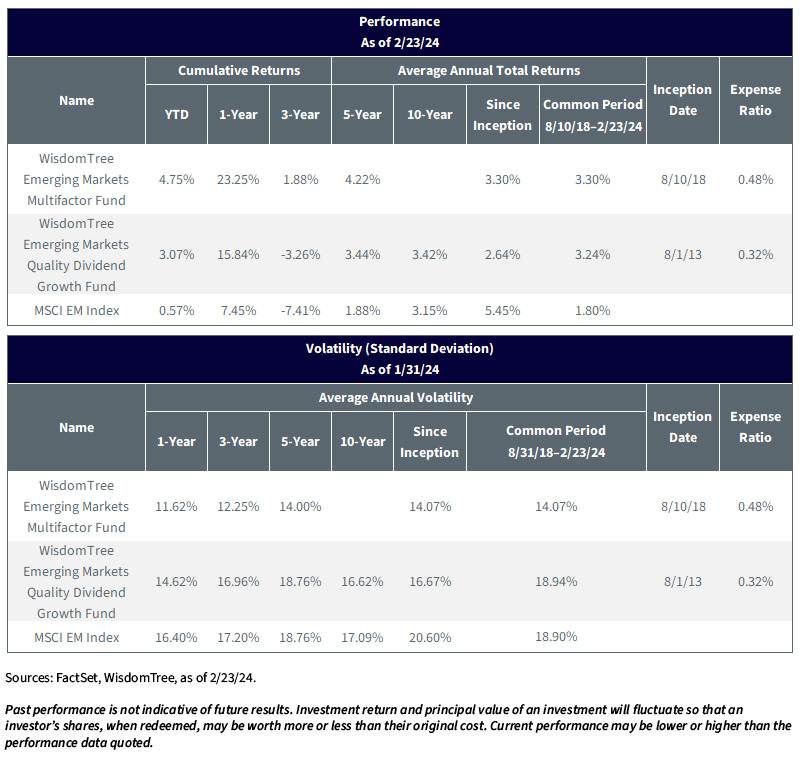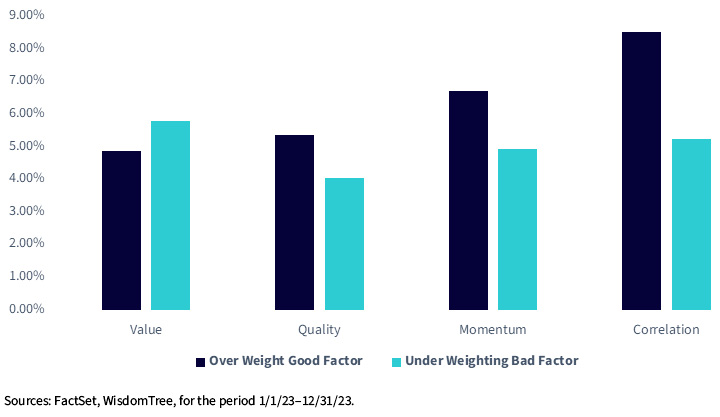By Liqian Ren, Director of Modern Alpha
Two common inquiries from clients regarding an emerging markets portfolio are the appropriate weight for China and the extent of currency hedging required. In our most actively managed emerging markets multifactor strategy and corresponding ETF, we address these concerns.
China’s Weight
The weight of China in a cap-weighted portfolio has significantly decreased from over 30% to around 22%, due to the aftermath of its highly leveraged housing bubble bursting and the increasing worry over continued crackdowns on private businesses since 2021. Despite its lower weight in popular benchmarks, China continues to dominate headlines as the U.S. identifies it as a major competitor, and we see little sign of major improvements coming for the U.S.-China relationship.
While China is exploring fiscal and monetary policy remedies, we’ve previously discussed that it’s unlikely to pursue stimulated growth. Concurrently, the U.S. continues to impose negative tech and trade restrictions.
To address this ongoing tension and uncertainty for China exposure, we offer a variety of options for clients, ranging from completely excluding China, as seen in our growth-oriented ex-China Fund (XC) and EM Quality Dividend Fund (DGRE), to the dividend-weighted Funds like DEM and DGS that follow a factor strategy and determine China’s weight accordingly.
But in our most active multifactor strategy, EMMF, China’s weight is about 10%, which is an under-weight position but still significant enough to capture some upside.
Various Emerging Markets Funds with China Weights from 0% to Full Index Weight
The under-weight position in China in 2023 benefited EMMF, as it outperformed the benchmark by approximately 14%. However, China isn’t the primary reason for EMMF’s outperformance.
About 2.7% alpha resulted from the Fund’s under-weight in China and 3.54% came from stock selection among Chinese stocks. The allocation and stock selection for India/Taiwan also added value, indicating the effectiveness of the factor model. On net total, stock selection accounts for twice as much outperformance than active country allocations.
EMMF Attribution for 2023: China accounts for half of outperformance, and more than half came from stock selection, not just allocation
Currency Hedging
Hedging emerging markets currencies is typically costly. However, due to the higher relative interest rate in the U.S., hedging in several currencies, such as CNY and TWD, now yields a positive carry.
We employ a factor-based dynamic currency model which generally lowered portfolio risk by about 1% annually.
As the below performance characteristics shows, under-weight allocations to China, factor bets on momentum and correlation, not just quality and value, which was implicit in the other strategy (DGRE), and dynamic currency hedging has worked to significantly lower risk.
Past performance is not indicative of future results. Investment return and principal value of an investment will fluctuate so that an investor’s shares, when redeemed, may be worth more or less than their original cost. Current performance may be lower or higher than the performance data quoted.
For the most recent month-end and standardized performances and to download the Fund prospectus, click here.
For definitions of terms in the tables above, please visit the glossary.
Factor Models in Stock Selection
In the emerging markets, whether a company is a state-owned enterprise (SOE) greatly impacts its profit margins. For the EM Multifactor Fund, we maintain a neutral weight in SOEs. In 2023, the factor-based stock selection model added value for both the SOE and non-SOE universe, with higher effect in the non-state-owned universe.
EMMF 2023: Most outperformance came from stock selection, not allocation between SOE/XSOE
EMMF’s multifactor strategy is over-weight in traditional factors (value, quality, momentum and correlation) from a bottom-up approach. The portfolio is typically over-weight in all four factors from the model that includes both deep selection of a multifactor score and then a weighting process that tilts weight to these factors and away from just market cap and size.
EMMF 2023: Active Factor Weight
The allocation effect of all four factors added value. More importantly, the stock selection effects of the factors were even more significant for 2023. Across all factors, and from both ends, from the over-weight allocation of good factor stocks, and the under-weight allocation of bad factor stocks, it all added value.
2023: Outperformance from both the over-weight in good factor and under-weight in factor score stocks
In Conclusion
In 2023, our most actively managed emerging markets portfolio had a successful year. Almost all models performed favorably, except for the currency model, though it did reduce the overall portfolio risk on top of the equity model.
As the portfolio carries significant active weight, its performance can be excellent, as seen in 2023, or it can underperform significantly. However, we believe that over the long run, factor investing in both equity and currency will yield returns, and a moderate weight in China is appealing to investors concerned about geopolitical risk.
Important Risks Related to this Article
Investing involves risk, the including possible loss of principal. Investments in non-U.S. securities involve political, regulatory and economic risks that may not be present in U.S. securities. For example, foreign securities may be subject to risk of loss due to foreign currency fluctuations, political or economic instability, or geographic events that adversely impact issuers of foreign securities. Derivatives used by the Fund to offset exposure to foreign currencies may not perform as intended. There can be no assurance that the Fund’s hedging transactions will be effective. The value of an investment in the Fund could be significantly and negatively impacted if foreign currencies appreciate at the same time that the value of the Fund’s equity holdings falls. While the Fund is actively managed, the Fund’s investment process is expected to be heavily dependent on quantitative models and the models may not perform as intended.
Additional risks specific to EMMF include but are not limited to emerging markets risk. Investments in securities and instruments traded in developing or emerging markets, or that provide exposure to such securities or markets, can involve additional risks relating to political, economic or regulatory conditions not associated with investments in U.S. securities and instruments or investments in more developed international markets. Please read the Fund’s prospectus for specific details regarding the Fund’s risk profile.
U.S. investors only: Click here to obtain a WisdomTree ETF prospectus which contains investment objectives, risks, charges, expenses, and other information; read and consider carefully before investing.
There are risks involved with investing, including possible loss of principal. Foreign investing involves currency, political and economic risk. Funds focusing on a single country, sector and/or funds that emphasize investments in smaller companies may experience greater price volatility. Investments in emerging markets, currency, fixed income and alternative investments include additional risks. Please see prospectus for discussion of risks.
Past performance is not indicative of future results. This material contains the opinions of the author, which are subject to change, and should not to be considered or interpreted as a recommendation to participate in any particular trading strategy, or deemed to be an offer or sale of any investment product and it should not be relied on as such. There is no guarantee that any strategies discussed will work under all market conditions. This material represents an assessment of the market environment at a specific time and is not intended to be a forecast of future events or a guarantee of future results. This material should not be relied upon as research or investment advice regarding any security in particular. The user of this information assumes the entire risk of any use made of the information provided herein. Neither WisdomTree nor its affiliates, nor Foreside Fund Services, LLC, or its affiliates provide tax or legal advice. Investors seeking tax or legal advice should consult their tax or legal advisor. Unless expressly stated otherwise the opinions, interpretations or findings expressed herein do not necessarily represent the views of WisdomTree or any of its affiliates.
The MSCI information may only be used for your internal use, may not be reproduced or re-disseminated in any form and may not be used as a basis for or component of any financial instruments or products or indexes. None of the MSCI information is intended to constitute investment advice or a recommendation to make (or refrain from making) any kind of investment decision and may not be relied on as such. Historical data and analysis should not be taken as an indication or guarantee of any future performance analysis, forecast or prediction. The MSCI information is provided on an “as is” basis and the user of this information assumes the entire risk of any use made of this information. MSCI, each of its affiliates and each entity involved in compiling, computing or creating any MSCI information (collectively, the “MSCI Parties”) expressly disclaims all warranties. With respect to this information, in no event shall any MSCI Party have any liability for any direct, indirect, special, incidental, punitive, consequential (including loss profits) or any other damages (www.msci.com)
Jonathan Steinberg, Jeremy Schwartz, Rick Harper, Christopher Gannatti, Bradley Krom, Kevin Flanagan, Brendan Loftus, Joseph Tenaglia, Jeff Weniger, Matt Wagner, Alejandro Saltiel, Ryan Krystopowicz, Brian Manby, and Scott Welch are registered representatives of Foreside Fund Services, LLC.
WisdomTree Funds are distributed by Foreside Fund Services, LLC, in the U.S. only.
You cannot invest directly in an index.
Originally published 7 March 2024.
For more news, information, and analysis, visit the Modern Alpha Channel.














